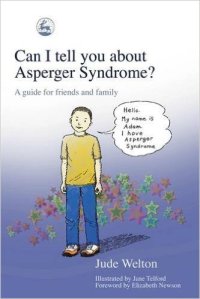Can I tell you about Aspergers Syndrome? – Jude Welton
 A book for friends and family of an AS child or teenager. It could, in theory, also be used to help introduce a child to their own AS and explain what being autistic means. Whilst it is a relatively brief introduction to Aspergers, it could also be used to help a new teacher understand the challenges a child in their class faces.
A book for friends and family of an AS child or teenager. It could, in theory, also be used to help introduce a child to their own AS and explain what being autistic means. Whilst it is a relatively brief introduction to Aspergers, it could also be used to help a new teacher understand the challenges a child in their class faces.
This book is primarily aimed at children and teenagers aged between 7-15 years of age, and that feels about right from the content. Younger children may need a quicker introduction and explanation, and older teenagers might benefit more from books like ‘Freaks, Geeks, and Asperger Syndrome’ by Luke Jackson, or ‘ Pretending to be Normal: Living with Asperger’s Syndrome’ by Liane Holliday Wiley.
The book quickly covers a number of areas including: reading feelings, tone of voice, loud noise and other sensory issues, motor skills, and how to help. It is kept deliberately brief and to the point for the sake of it’s target audience, but manages to provide a lot of information in a non-patrionising way.
And sometimes I just feel overwhelmed by all the noise and sights around me. If I meet lots of new people at once, I can’t always tell their faces apart, and that’s confusing. If the classroom is noisy, I find it really difficult to concentrate, and don’t always notice if someone talks to me. I don’t mean to be rude.
Most, if not all, children are going to attend school with an autistic/AS child or teenager. Based on the places I have worked, the subject of autism is not always addressed in the classroom, and teachers do not broach the matter with neurotypical children. In some places this matter resolves itself because children just ask the one-to-one support or other adults in the school, but this isn’t always the case. Even if it were, unfortunately some one-to-one support staff are just as misinformed about autism as other people.
That’s why I think books like these are important and should be available in primary and secondary schools (I brought this up when I reviewed Ian’s Walk). Children and teenagers can and do asked adults about things, or (with increasing frequency) they will do their own research online. The problem with the internet is there can be too much information, and if a child googles autism they might find themselves overloaded with information and not all of it is good.
Some children with AS may listen better when they are not looking at the teacher. Sometimes I feel overloaded with the information coming in through my eyes and ears. Then I might need to listen, but not look. I’m not meaning to be rude. At that time, this may be the only way for me to pay attention to what you are saying.
Obviously this book cannot possibly address the individuality and differences of every single autistic person, I can’t imagine a book that could. The book does point out at intervals that autistic people are all different, and what is described in this book will not be the same for all autistic people. What this book does is provide a fictional character, Adam, who tells the reader about the difficulties and differences he has. It provides information and practical advice to other children and teenagers about what it is like to have Aspergers, and how they can help.
Is it worth reading? Yes, for friends of and siblings of autistic/AS children, this book is worth reading. If you have an autistic child in your classroom, it might be worth investing in this book (although obviously talk to the autistic child and their family before doing so or addressing the matter)
[…] have already reviewed the book by Welton in which we were introduced to Adam, Can I tell you about Asperger’s Syndrome?, and this book gives us a fictional story about Adam and how he learns to deal with school life, […]
LikeLike
[…] short book from the Can I tell you about… series. I have already reviewed Can I Tell you About Aspergers Syndrome, and this book is similar to that one in terms of layout and it’s concept as an introductory […]
LikeLike
[…] about an autistic boy called Tomas. Written by the same author who wrote previously reviewed books ‘Can I Tell You about Aspergers Syndrome?’, ‘What Did You Say, What Did You Mean?’ and ‘Adam’s Alternative […]
LikeLike